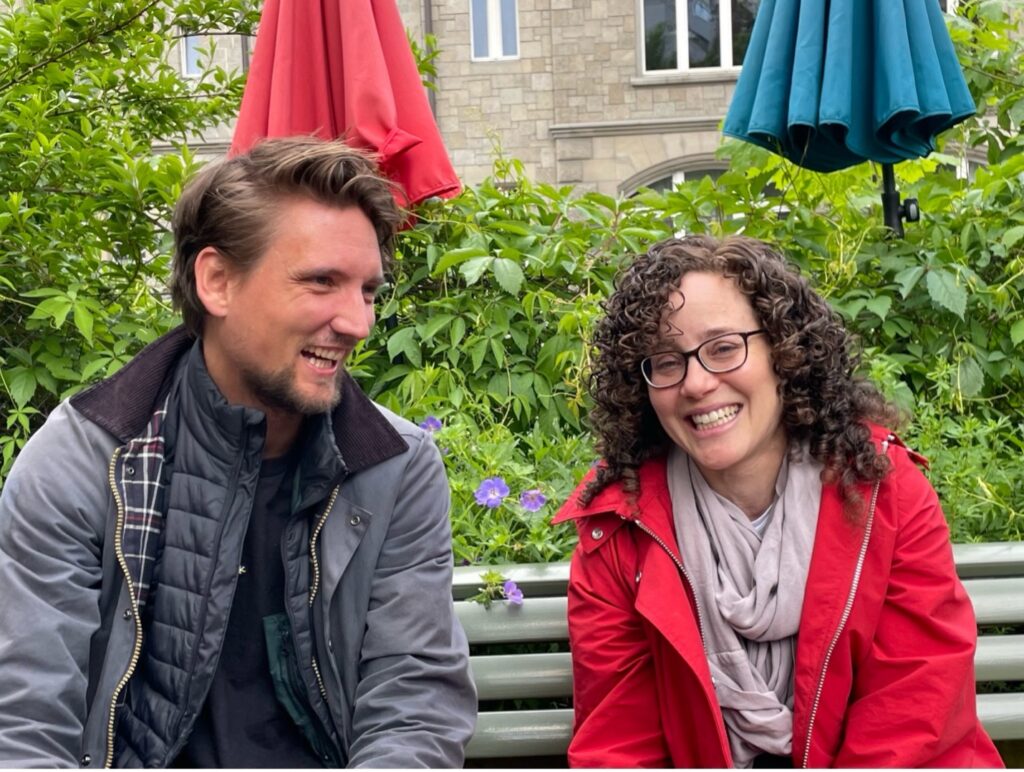As the Energy Blog celebrates its 100th post, we spoke with two of its founders, Yael Borofsky and Florian Egli, to look back on its origins, impact, and the evolving world of energy research. What started as a casual idea among friends during a winter course at ETH Zurich has grown into a respected platform bridging academia, policy, and public conversation.
Take us back to the beginning. How did the Energy Blog come about?
Florian: We met in an energy economics class, and over lunch, we realized how odd it was that we had not met before. Energy researchers at ETH weren’t well connected. The class was taught by Meredith Fowlie, who was doing really policy-relevant work and talked about engaging with a wider audience. Berkeley had an energy blog, and we thought: why not do something similar here? We liked each other and just wanted to work on something together. From there, it all moved quickly.
Yael: A big part of our motivation was also about communication. Scientists aren’t really taught how to write for broader audiences. The blog gave researchers a chance to practice that skill and get feedback in a supportive space. It wasn’t just about sharing research—it was about learning how to do that well.
Florian: Honestly, the landscape in Switzerland was empty when it came to this kind of thing. If you were into energy, who or what medium did you even follow? There were some good international podcasts, but nothing that was regular, topical, locally relevant, and scientifically grounded. The blog became this nice middle ground: insightful, but digestible.
What was the energy research and public conversation landscape like at the time?
Yael: We were working on policy-relevant PhDs and really wanted our research to matter. But we realized you can’t just leave it in academic journals and expect change.
Florian: I started my PhD not even knowing the difference between a kilowatt and a kilowatt-hour. And yet, energy is in everything: your phone, your car, your food, your economy. It literally powers our society. Even people in climate and sustainability often don’t fully understand where energy comes from or how it works. That disconnect is a big reason why we felt the blog was needed.
How has the field of energy research changed since the blog launched?
Yael: The language around topics like electricity access has shifted—from “energy poverty” to “energy justice.” There’s more awareness about how energy affects equity.
Florian: There’s also been a big shift in focus. Five years ago, it was all about deploying renewables like solar and wind faster. Now, the harder-to-abate sectors are front and center: how to decarbonize industry, aviation, maritime transport. Technologies like direct air capture are gaining attention.
Also, the field itself has opened up. It used to be dominated by engineers. Now, social scientists, political scientists, and others are jumping in. That makes the conversation richer and more complex.
Yael: And geopolitics has made energy a headline issue. Since the war in Ukraine, energy became central to political discourse. People realized their heating depends on gas and energy poverty suddenly became a European topic as well.
What role can grassroots platforms like the Energy Blog play compared to institutional outlets?
Florian: They can be faster, more personal, and more open about the limits of research. We need platforms that say: here’s what we know, here is what we don’t, and here is how we interpret it—without hiding behind technicalities.
If one study says an energy system based on renewables won’t be stable, and another says it is fine, the public and journalists need independent researchers to contextualize.
At what point did you realize the blog could outlast you as founders?
Florian: For me, the turning point was when we got others involved. At first, it was very much our baby. But the real magic happens when more people take ownership—it becomes bigger than just you.
Yael: Exactly. We were worried that once we stepped back, it might just fizzle out. But seeing it thrive on its own now, with 100 posts and even a new website coming—it is honestly so cool. It really feels like we planted something that keeps growing.
Is there any specific blog post you were particularly proud of?
Yael: I remember when Churchill Agutu joined as an editor. One of his posts got a lot of comments and sparked real engagement. It wasn’t just academics—people from all over reached out. That was such a moment of, “Yes! This is what we wanted to happen.”
What would your next blog post be about?
Florian: I’d write about how new data sources—like smart meters or satellite data—could help answer big questions in energy research. There’s so much untapped potential there.
Yael: I’d write about how people in the U.S. are seeing their energy projects and funding cut. Where is energy research heading in the U.S.? That interests me a lot.
Last, but not least—what’s your favorite surprising energy fact?
Florian: Okay, so here’s one I just learned and absolutely love—also because it shows how energy is literally everywhere. Did you know that a farmed outdoor salmon lives for almost three years before it is ready to be eaten? That’s three years of energy-intensive farming. Now compare that to shrimp—they grow in just 75 days! So if you want low-energy seafood, shrimp is your go-to.
Yael: Mine is a visual one: there’s this graph (link: graph) (from Todd Moss at the Center for Global Development and the Energy for Growth Hub) I love that shows the energy consumption of an average American refrigerator compared to the per capita energy use of people in a few African countries. And yep—the fridge uses way more. It is a gut-check about global inequality and just how energy-intensive our lifestyles are.

Florian Egli is an Assistant Professor at TU Munich, where he leads the interdisciplinary research group Public Policy for the Green Transition and the Transformation Finance Lab at the TUM Think Tank. He is also the co-founder and co-president of Expedition Zukunft.
Yael Borofsky is a post-doctoral researcher in the Spatial Development and Urban Policy group focused on universal access to reliable, affordable infrastructure in underserved areas.




Congratulations! This goes to the whole team who started the idea, pulled it off, and kept it going.